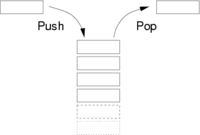template<typename T>
class CppCommon::Stack< T >
Intrusive stack container.
Stack represents container with LIFO (last in - first out) stock algorithm. For example, you insert item A into stack. Then you insert item B into stack. There is an item B on the top of the stack. After removing item B, there will be an item A on the top of the stack.
Top-<--- Insert here
|
+-----+ +-----+ +-----+ +-----+
| | Next | | Next | | Next | | Next
| 1 |-------->| 2 |-------->| 3 |-------->| 4 |--------> NULL
| | | | | | | |
+-----+ +-----+ +-----+ +-----+
|
+-->--- Remove from here
Not thread-safe.
Overview

Stack
In computer science, a stack is a temporary abstract data type and data structure based on the principle of Last In First Out (LIFO). Stacks are used extensively at every level of a modern computer system. For example, a modern PC uses stacks at the architecture level, which are used to run an operating system. The operating system also uses stacks, which are used to run a Java Virtual Machine, which is stack oriented, and the Java language itself has a class called "Stack", which can be used by the programmer. The stack is ubiquitous.
A stack-based computer system is one that stores temporary information primarily in stacks, rather than hardware CPU registers (a register-based computer system).
Abstract data type
As an abstract data type, the stack is a container (data structure) of nodes and has two basic operations: push and pop. Push adds a given node to the top of the stack leaving previous nodes below. Pop removes and returns the current top node of the stack. A frequently used metaphor is the idea of a stack of plates in a spring loaded cafeteria stack. In such a stack, only the top plate is visible and accessible to the user, all other plates remain hidden. As new plates are added (pushed), each new plate becomes the top of the stack, and hides each plate below. As plates are removed (popped) from the stack, they can be used, and second plate becomes the top of the stack. Two important principles are illustrated by this metaphor, the Last In First Out principle is one. The second is that the contents of the stack are hidden. Only the top plate is visible, so to see what is on the third plate, the first and second plates will have to be removed.
Other Operations
In modern computer languages, the stack is usually implemented with more operations than just "push" and "pop". The length of a stack can often be returned as a parameter. Another helper operation peek can return the current top node of the stack without removing it from the stack.
Implementation
A typical storage requirement for a stack of n elements is O(n). The typical time requirement of O(1) operations is also easy to satisfy with an dynamic array or (singly) linked list implementation.
History
The stack method of expression evaluation was first proposed by early German computer scientist F.L. Bauer, who received the IEEE Computer Society Pioneer Award in 1988 for his work on Computer Stacks.
References
- Donald Knuth. The Art of Computer Programming, Volume 1: Fundamental Algorithms, Third Edition. Addison-Wesley, 1997. ISBN 0-201-89683-4. Section 2.2.1: Stacks, Queues, and Deques, pp. 238-243.
- Thomas H. Cormen, Charles E. Leiserson, Ronald L. Rivest, and Clifford Stein. Introduction to Algorithms, Second Edition. MIT Press and McGraw-Hill, 2001. ISBN 0-262-03293-7. Section 10.1: Stacks and queues, pp.200-204.
Taken from:
Stack (data structure) from Wikipedia, the free encyclopedia http://en.wikipedia.org/wiki/Stack_%28data_structure%29
- Examples
- containers_stack.cpp.
Definition at line 105 of file stack.h.
